-
Welcome to the eG Forums, a service of the eGullet Society for Culinary Arts & Letters. The Society is a 501(c)3 not-for-profit organization dedicated to the advancement of the culinary arts. These advertising-free forums are provided free of charge through donations from Society members. Anyone may read the forums, but to post you must create a free account.
How I Became a Professional Cook in France
-
Similar Content
-
- 80 replies
- 29,746 views
-
- 78 replies
- 19,377 views
-
- 114 replies
- 22,990 views
-
- 232 replies
- 14,948 views
-
- 127 replies
- 40,130 views
-
-
Recently Browsing 0 members
- No registered users viewing this page.







Recommended Posts